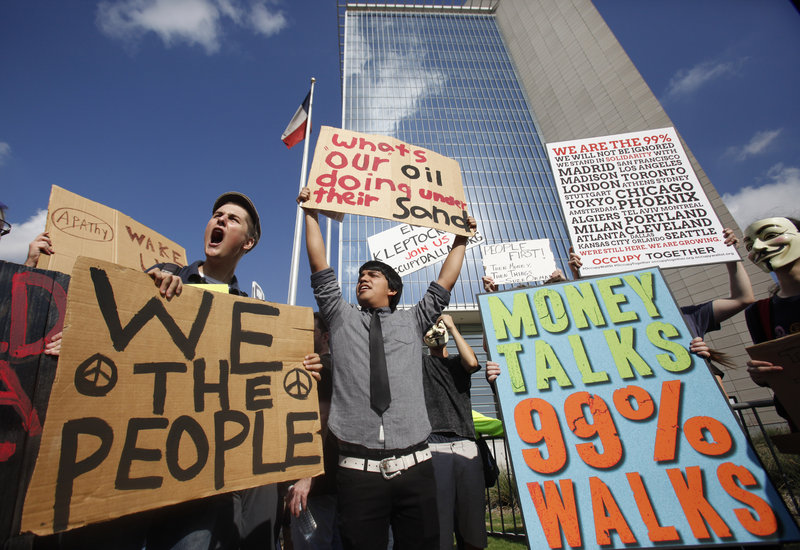NEW YORK – Their chief target is Wall Street, but many of the demonstrators in New York and across the United States are also thoroughly disgusted with Washington, blaming politicians of both parties for policies they say protect corporate America at the expense of the middle class.
“At this point I don’t see any difference between George Bush and Obama. The middle class is a lot worse than when Obama was elected,” said John Penley, an unemployed legal worker from Brooklyn.
The Occupy Wall Street movement, which began last month with a small number of young people pitching a tent in front of the New York Stock Exchange, has expanded nationally and drawn a wide variety of activists, including union members and laid-off workers. Demonstrators marched Thursday in Philadelphia, Salt Lake City, Los Angeles and Anchorage, Alaska, carrying signs with slogans such as “Get money out of politics” and “I can’t afford a lobbyist.”
The protests are in some ways the liberal flip side of the tea party movement, which was launched in 2009 in a populist reaction against the bank and auto bailouts and the $787 billion economic stimulus plan.
But while tea party activists eventually became a crucial part of the Republican coalition, the Occupy Wall Street protesters are cutting President Obama little slack. They say Obama failed to crack down on the banks after the 2008 mortgage meltdown and financial crisis.
“He could have taken a much more populist, aggressive stance at the beginning against Wall Street bonuses, and exacting certain change from bailing out the banks,” said Michael Kazin, a Georgetown University history professor and author of “American Dreamers,” a history of the left. “But ultimately, the economy has not gotten much better, and that’s underscored the frustration on both the right and the left.”
Obama on Thursday acknowledged the economic insecurities fueling the nearly 3-week-old Wall Street protests. But he pinned responsibility on the financial industry and on congressional Republicans who he says have blocked his efforts to kick-start job growth.
“I think people are frustrated and the protesters are giving voice to a more broad-based frustration about how our financial system works,” he said at a nationally televised news conference. “The American people understand that not everybody has been following the rules, that Wall Street is an example of that … and that’s going to express itself politically in 2012 and beyond.”
Copy the Story Link
Send questions/comments to the editors.



Success. Please wait for the page to reload. If the page does not reload within 5 seconds, please refresh the page.
Enter your email and password to access comments.
Hi, to comment on stories you must . This profile is in addition to your subscription and website login.
Already have a commenting profile? .
Invalid username/password.
Please check your email to confirm and complete your registration.
Only subscribers are eligible to post comments. Please subscribe or login first for digital access. Here’s why.
Use the form below to reset your password. When you've submitted your account email, we will send an email with a reset code.